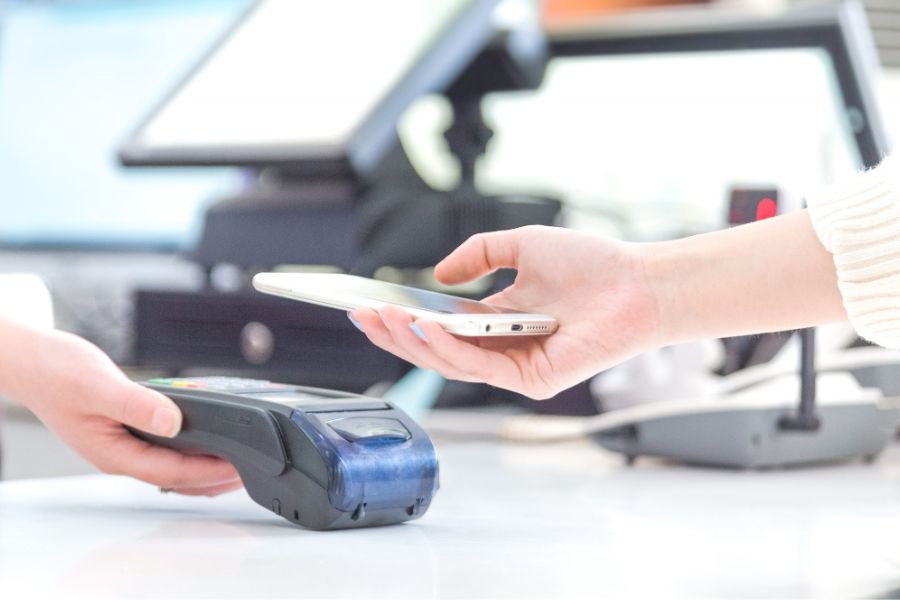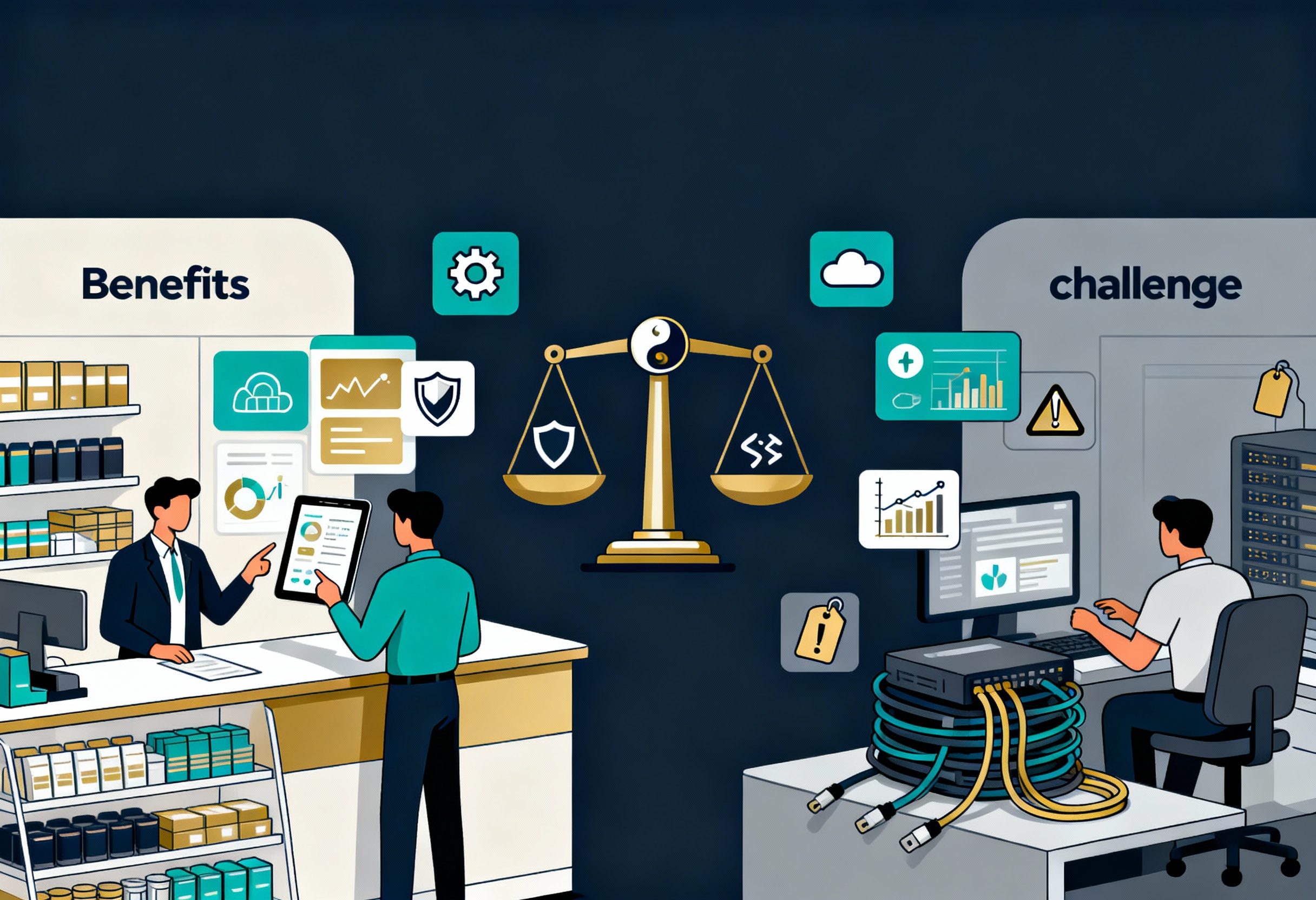Integrating RFID technology with POS systems is a game-changer for omnichannel retail, enabling seamless operations and a superior customer experience. This guide delves into the intricacies of RFID POS integration, highlighting its benefits, implementation strategies, and best practices for maximizing efficiency and sales
Highlights
- RFID uses electromagnetic fields to identify and track tags, offering real-time data and improved inventory visibility.
- RFID enhances inventory accuracy, reduces errors, and lowers operational costs.
- Integrating RFID with POS automates inventory management and speeds up checkout, boosting customer satisfaction and efficiency.
RFID POS and Its Role in Retail
RFID (Radio Frequency Identification) technology is transforming the retail industry by enhancing the efficiency and accuracy of inventory management, streamlining operations, and improving the overall customer experience.
Integrating RFID with your retail POS system can provide numerous benefits, including real-time tracking, improved stock visibility, and reduced labor costs.
First, we will explore why it is important in retail. While RFID technology has various applications in retail, one of its primary benefits is providing merchants with access to valuable information, such as an inventory overview.
Once integrated with the POS system, RFID can help track products, ensuring that items do not leave the store without being purchased. This technology also ensures that products are always available for purchase, preventing disruptions to the customer experience.
A significant advantage of RFID at POS is the acceleration of the checkout process and the provision of contactless functionality for a secure shopping experience. This technology can enhance overall customer satisfaction by making store transactions precise, quick, and seamless.
Nevertheless, these are only a broad view of RFID’s impact on retail operations, we’ll get into more detail in the next section.
Advantages of Integrating RFID with POS Systems
Combining RFID technology with POS systems offers multiple advantages that improve operational efficiency and customer satisfaction.
- Improve Inventory Management
RFID technology revolutionizes inventory management by providing real-time tracking and detailed visibility of stock levels. Traditional inventory management methods often suffer from inaccuracies due to human error or manual counting. RFID systems address these issues by automating the tracking process.
RFID tags embedded in products communicate with readers to update inventory records instantly. This continuous and accurate data helps retailers maintain optimal stock levels, reduce the risk of stockouts, and minimize overstock situations.
►►► Optimal solution set for businesses: Multi store POS, Next-gen POS, Inventory Management Software (MSI), Self Service, Automation, Backorders
Up-to-date inventory data allows better supply chain management and more effective responses to market demand.
- Boost Efficiency
Integrating RFID with POS systems (like ConnectPOS) dramatically improves operational efficiency. Traditional inventory management requires manual stock counts, which are time-consuming and error-prone.
RFID technology automates inventory tracking, eliminating the need for manual checks. This allows staff to focus on critical tasks, such as assisting customers or managing store operations.
Moreover, RFID speeds up the checkout process by enabling quick and accurate scanning of multiple items simultaneously. This efficiency not only cuts labor costs but also enhances overall store productivity, allowing businesses to operate more smoothly.
- Upgrade Customer Experience
RFID POS systems significantly improve customer satisfaction. RFID enables faster checkout experiences by scanning multiple items in bulk, reducing wait times.
Customers enjoy shorter lines and quicker transactions, enhancing their shopping experience. RFID also provides accurate real-time information about product availability, helping customers find what they need without encountering stockouts.
These conveniences foster a positive shopping experience, encouraging customer loyalty and repeat business.
- Strengthen Security
RFID systems improve security within retail environments, precisely tracking products. With RFID tags attached to items, retailers can monitor product movement throughout the store and detect unauthorized removal.
This capability helps mitigate theft and loss, which are major concerns for many retailers. RFID systems can trigger alerts if items are moved out of designated areas without proper authorization, bolstering store security.
- Inform Decision-Making with Data
The integration of RFID with POS systems (such as ConnectPOS) provides valuable data that supports informed decision-making. RFID technology generates detailed insights into inventory levels, sales patterns, and product movement. Retailers can analyze this data to identify trends, adjust stock levels, and make strategic decisions about product placement and promotions.
For example, data collected through RFID can reveal which products are selling well and which are not, allowing retailers to adjust their inventory and marketing strategies accordingly.
6 Steps to Integrate RFID with POS Systems for Omnichannel Retail
If you operate a retail business and aim to stay ahead of industry trends, integrating advanced RFID technology is essential. To effectively leverage RFID for digital transformation, consider implementing the following steps, which span from inventory management to the POS:
Step 1: Identify Issues You Need to Solve
Before integrating RFID technology, pinpoint the specific issues you aim to address.
Typically, this involves auditing your existing processes and data to uncover any weaknesses. Gathering feedback from customers can also provide valuable insights into areas needing improvement.
RFID technology can address several common retail challenges, including inventory traceability and accuracy, product availability, reducing excess stock, and operational inefficiencies.
Fortunately, these challenges are associated with clear key performance indicators (KPIs), which will help you assess your current performance and determine how well your business is keeping up with industry standards and competition.
Step 2: Select an RFID Technology Vendor
Choosing the right RFID technology vendor is crucial for a successful integration. Evaluate vendors based on their technology offerings, compatibility with your current POS systems, and their ability to provide ongoing support.
Look for vendors with a proven track record of successful implementations and offer comprehensive solutions, including tags, readers, and software. Assess their customer service, warranty policies, and training support to ensure you receive adequate assistance throughout the integration process.
Request demonstrations and pilot projects to verify the effectiveness of their solutions in your retail environment.
Step 3: Conduct a Testing Phase
Before fully committing to an RFID system, always conduct a thorough testing phase to ensure its effectiveness and compatibility with your existing POS systems. Implement RFID technology in a controlled environment or a specific store location to evaluate its performance.
Test various scenarios, such as different types of products, store layouts, and sales transactions. Monitor how the RFID system interacts with your POS system, focusing on data accuracy, system reliability, and user experience.
During this phase, gather feedback from staff and customers to identify any issues and make necessary adjustments before a full-scale rollout.
Step 4: Gradually Implement RFID Features
Once testing is complete and any issues have been addressed, begin a phased implementation of RFID features across your retail locations.
Start with a few key areas, such as inventory management or product tracking, and gradually expand to other functionalities like sales transactions and customer engagement.
This phased approach allows you to manage the transition smoothly and provides time to address any challenges that arise. Ensure that each phase is thoroughly documented and evaluated to gauge the effectiveness of the RFID integration and make data-driven decisions for subsequent phases.
Step 5: Enable Omnichannel Services
Integrate RFID technology with your omnichannel strategy to enhance customer experience across all touchpoints. RFID can facilitate seamless interactions between online and physical stores, enabling features such as real-time inventory updates, accurate stock availability, and personalized shopping experiences.
Implement RFID-enabled services such as click-and-collect, ship-from-store, and real-time inventory visibility to provide customers with a cohesive shopping experience.
Ensure that your POS system and RFID technology work in harmony to support these omnichannel services and deliver consistent and accurate information to customers.
Step 6: Train Your Store Staff
Effective training is essential for the successful adoption of RFID technology in your retail operations. Provide comprehensive training to your store staff on how to use RFID systems, including how to handle RFID-enabled products, operate RFID readers, and manage inventory using RFID data.
Emphasize the benefits of RFID technology and how it can enhance their daily tasks and improve the customer experience. Offer ongoing support and resources to address any questions or challenges staff may encounter.
Regularly update training materials and conduct refresher courses to ensure that staff remain proficient in using RFID technology and adapting to any system updates or changes.
Case Studies: Success Stories of RFID and POS Integration
ZARA
Zara, the global fashion retailer, has used RFID technology to transform its inventory management and customer experience. By merging RFID with their POS systems, Zara has achieved notable operational efficiencies and improved customer satisfaction.
- Inventory Management
Zara places RFID tags on every item in its stores, allowing for real-time tracking of inventory levels. This technology provides Zara with precise stock information across all stores, warehouses, and distribution centers. As a result, they can quickly identify stock levels, locate specific items, and restock shelves efficiently.
- Enhanced Customer Experience
The integration of RFID with POS systems has enabled Zara to offer improved customer service. Store staff can quickly check stock availability and locate items for customers, reducing wait times and improving overall satisfaction. The company can also execute its omnichannel strategies more effectively, offering services like online ordering with in-store pickup smoothly.
- Operational Efficiency
Automating inventory management through RFID and POS integration has helped Zara avoid stockouts and overstock situations. This has led to cost savings and better use of resources. The streamlined processes also allow Zara to respond quickly to market trends and customer demands, ensuring they always have the right products available.
In summary, Zara’s success with RFID and POS integration showcases how advanced technology can transform retail operations, from inventory management to customer service, ultimately enhancing competitiveness and profitability.
Walmart
Walmart, one of the world’s largest retailers, has implemented RFID and POS integration across its vast network of stores to improve efficiency and customer satisfaction.
- Supply Chain Visibility
Walmart utilizes RFID technology to track shipments from suppliers to distribution centers and stores. This end-to-end visibility allows Walmart to optimize its supply chain, reduce errors, and ensure timely delivery of products to stores.
- Inventory Accuracy
By combining RFID with POS systems, Walmart has greatly improved inventory accuracy. This results in fewer instances of stockouts or overstocking, leading to better shelf availability and improved sales performance. Employees can also locate items more quickly, enhancing customer service.
- Operational Streamlining
The integration of RFID and POS has simplified Walmart’s operational processes. It supports automated replenishment systems based on real-time inventory data, minimizing manual intervention and improving efficiency. This efficiency translates into cost savings and better management of store resources.
- Customer Experience
Walmart’s investment in RFID technology has also benefited customers. With better inventory visibility and accuracy, Walmart can fulfill customer orders more reliably, whether in-store or through online channels. This enhances customer satisfaction and loyalty.
Generally, Walmart’s success story with RFID and POS integration demonstrates how technology can drive operational excellence in retail, leading to improved supply chain management, inventory accuracy, and ultimately, a better customer experience.
The achievements of Zara and Walmart showcase the powerful impact of combining RFID with POS systems, and ConnectPOS is ready to offer similar advantages to retailers of all sizes.
ConnectPOS works with RFID technology to help retailers achieve success akin to industry leaders like Zara and Walmart. By using RFID, ConnectPOS improves inventory precision, simplifies operational processes, and enhances customer experiences. This integration allows retailers to manage their stock more effectively, cut operational costs, and provide real-time product availability, leading to higher customer satisfaction and loyalty.
Aside from these capabilities, ConnectPOS also provides solutions ranging from CRM to mobile POS, catering to a wide array of retail needs.
FAQS: RFID and POS Integration
- What benefits do RFID and POS integration offer to retailers?
Integrating RFID with POS systems enhances inventory accuracy, speeds up checkout, and boosts operational efficiency. It allows real-time inventory tracking, reduces manual errors, and improves customer satisfaction with up-to-date stock information and seamless omnichannel services.
- How does RFID technology support an omnichannel retail strategy?
RFID technology supports an omnichannel POS strategy by providing real-time inventory visibility across all sales channels. This ensures accurate stock information for online and in-store purchases, enabling services like click-and-collect and ship-from-store, and offering a seamless shopping experience.
- What steps should a retailer take to implement RFID with their POS system?
To implement RFID with a POS system, retailers should:
- Identify specific issues to address.
- Choose a reliable RFID technology vendor.
- Conduct a testing phase for compatibility.
- Gradually roll out RFID features.
- Integrate RFID with omnichannel services.
- Train store staff on using the RFID system.
Conclusion
In sum, integrating RFID technology with POS systems marks a transformative step for modern retailers aiming to boost efficiency, accuracy, and customer satisfaction. With RFID POS integration, inventory management becomes automated, offering real-time tracking that streamlines everything from stocking to checkout. This innovation cuts labor costs and minimizes errors inherent in traditional methods. By adopting RFID POS, retailers can stay ahead of industry trends, delivering seamless, efficient service that keeps customers coming back.
As retailers navigate the complexities of adopting RFID technology, solutions like ConnectPOS offer tailored support and expertise to ensure seamless integration and maximize the potential of RFID POS systems.
To explore how ConnectPOS can optimize your retail operations, contact us today.
►►► Optimal solution set for businesses: Shopify POS, Magento POS, BigCommerce POS, WooCommerce POS, NetSuite POS, E-Commerce POS



